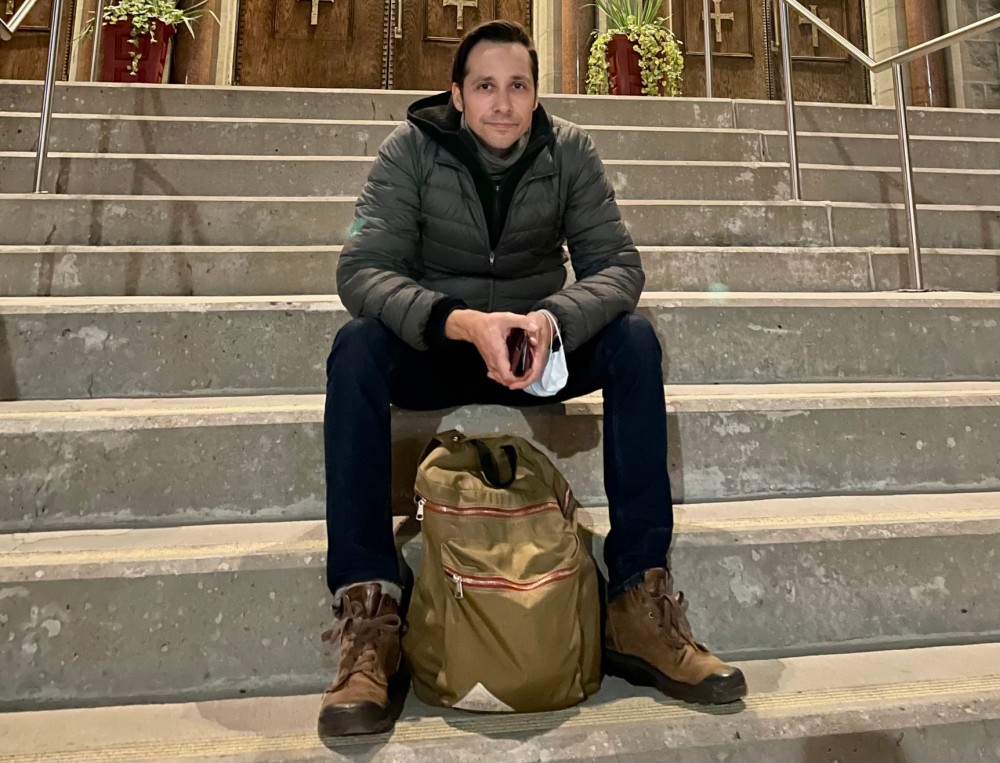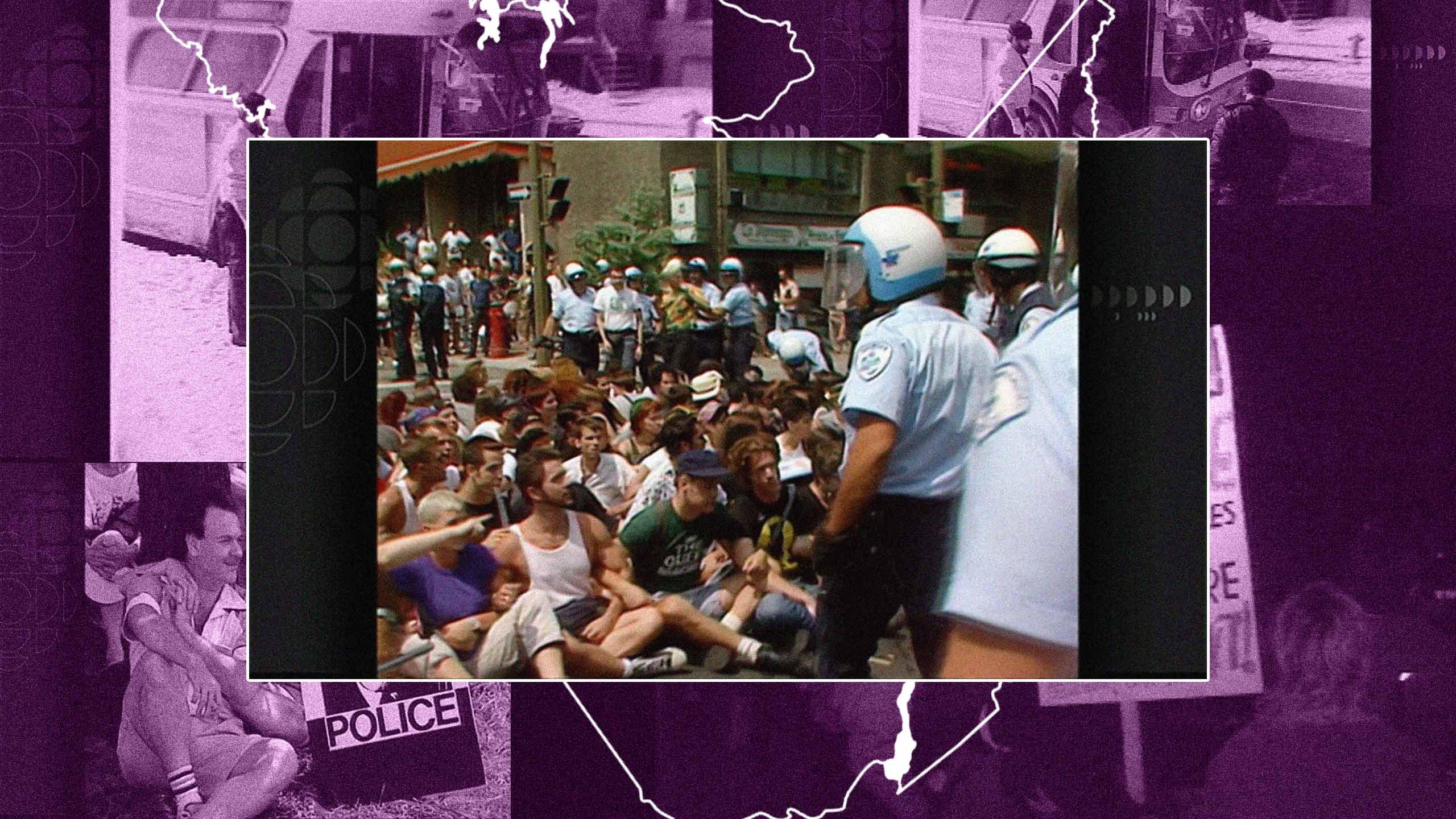In its acclaimed first season, CBC investigative true crime podcast The Village dug deep into the disappearance of men from Toronto’s gay village and the serial killer—Bruce McArthur—behind their murders. In its second season, the focus shifted to the disappearance of two trans women, Alloura Wells and Cassandra Do, whose deaths remain unexplained.
Now in its third season, the podcast is set to take us further back in time to investigate a series of disturbing murders in another LGBTQ2S+ community in The Village: The Montreal Murders.
Producer and host Francis Plourde takes over for Justin Ling (while Marie-Eve Tremblay handles Radio-Canada’s French-language sister production), as the podcast’s new season focuses on a time period when a confluence of crises were striking the LGBTQ2S+ community. Listeners arrive on the scene in Montreal, 1989, when queer people are being murdered as AIDS ravages the community and the Catholic Church and police wield their mighty power over the lives of LGBTQ2S+ people. These oppressive forces triggered a reaction in the community, which started mobilizing to advance LGBTQ2S+ rights and save lives.
Plourde spoke to Xtra about unearthing queer history, the ethics of true crime and what listeners can expect to learn from the latest investigation.
The first two seasons of The Village were hosted by journalist Justin Ling. How did you get involved with producing the third season, and in digging into this story in particular?
I was approached back in June of last year, actually. During the first two seasons of The Village, there there had been a mention of a series of murders in Montreal. And what group of activists had done to make sure the police would take those murders seriously. But it was really just mentioned in an interview and a couple of news clips.
I’m from Quebec, and [the CBC] wanted somebody who was bilingual who could look at all that and see if there was potential for a third season. I started digging into it, and it quickly became clear to me that there was material not only to discuss whether or not there was a serial killer in Montreal in the early ’90s, but also to discuss other topics like the AIDS crisis, homophobia and police brutality in Montreal. We felt like there was enough material in there to do a full season.
What was your familiarity with the stories in the podcast as they were happening?
From 1989 to 1993, I was between seven and 10 years old, so I had no real awareness of what was going on. But of course at school, we had discussed topics like HIV/AIDS. I vaguely remembered one of the murders—a story about a guy in Montreal who was on his bike, and he was knifed down and killed. You remember kind of that stuff as a kid, but you don’t understand the subtext around it and that there was homophobia attached to it.
So, I had a basic knowledge of what had happened, but I was surprised at the number of events which happened during that period that I was completely unaware of. There was the brutal murder of Joe Rose on a city bus in 1989. I had no idea about that. The Sex Garage events in Montreal in 1990, which was a warehouse party that was raided by police. Police got people outside and they started beating them, and eventually the community decided to rally and mobilize and expose that brutality. But I had no recollection of those events.
It was interesting to me because, yeah, I’m gay. I have a boyfriend and we live our life—there’s no secret around that. But my life is so different from the lives of the people I interviewed; there was a huge generation gap.
What was it like speaking to these older queer activists for the podcast?
I didn’t live the experience of being in my 20s or 30s at the worst of the AIDS epidemic, of losing my circle of friends in it and having to be careful about exposing my life. And there was no queer representation in the media. In the late ’90s and early 2000s, you had to be careful, but all that was not something that I experienced. I knew about it, but I didn’t experience it. And so, that was a big realization for me.
For fans of the first two seasons, what do you think will be different for them coming into this one?

The basis of the series is still true crime as a way to expose a number of issues related to homophobia. I think what’s going to be different this season is that we focus quite a bit on the impact of the AIDS crisis on the community in terms of fuelling hatred and homophobia.
We go back in time through the years, and that’s a way for us to reflect on changes that had time to happen during that period, which I think was not as present in seasons one and two. I mean, Bruce MacArthur was arrested as a serial killer in 2019. So that was almost current affairs.
Justin did such a good job in seasons one and two, so now we can go deeper into other topics that were not approached. We have an episode completely dedicated to homophobia within the Church and the impact of the Church and fuelling homophobia because there were two murders in Montreal where the victims happen to be priests. So we look at the complexities of that in a way that we couldn’t do in seasons one and two.
There have been a lot of cultural conversations around true crime, particularly true crime podcasts, and the ethics of them. Obviously, this isn’t just reading some gruesome Wikipedia page and calling it a day—this is journalism with all of the investigations and interviews and everything required. But I’m curious to hear your thoughts about navigating the true crime space in producing this.
I’m not going to pretend that we’re going to solve any murder cases here. There are still a couple of those cases, seven of them out of 17 over a four-year period, that are still unsolved. What we decided to take in terms of approach is that we were revisiting some of the investigations to really understand the complexity of those cases. We were also trying to understand the challenges for the police as well. It was really interesting because, on one hand, you had cops who were openly homophobic against the community on the street, but on the other hand, you also had detectives, which was, like, a completely separate department, and many of them were taking their job seriously. I think they had blind spots, as everybody does, but I don’t think that they didn’t take their jobs seriously.
We try not to sensationalize or focus on the gory aspects of the cases. Really, in a way, we tried to portray the individuals’ lives. We tried to do that by reaching out to friends and family so they could give us a sense of the lives of those individuals and who they were as people, and not just as victims.
You have to walk a fine line between keeping the audience engaged and sensationalizing what happened.
It’s such a fine balance, because on one hand, you don’t want to sanitize those stories, because sometimes you have to tell some details of those cases to understand the horror that those individuals went through. But you don’t want to sensationalize it in a way that they’re just going to become like the murder of the week. We had to have tough discussions as well. Some people were generous enough with their time, and they agreed to sit down for an interview. In other cases they respectfully declined because they felt it was too painful.
You spoke about how the first season focused on essentially current events—the Bruce McArthur case. With this looking into events several decades in the past, what lessons do you think the queer and trans folks of today have to learn?
You know, 30 years is a long time, but it’s also a very short time in the big scheme of things. I see this podcast as a way to share our history. There are also several lessons to learn from it. Like how in the middle of so much death, you had a group of people who decided to take matters into their own hands. They were like, “Okay, nobody’s gonna fight for us. So we might as well just fight for our own rights for respect [and] for equality.”
At some point they realized that all of their social problems that they had in Montreal at that specific time were related to the fact that they didn’t have equal status in society. So they decided that the solution, or one of the solutions, to their problems was to get public hearings from the Human Rights Commission in Quebec on discrimination and violence against gays and lesbians. It sounds super boring, but it’s something that they felt strongly about. I think they were right in retrospect, to ask for that, because it allowed them to publicly expose the problems that the community was facing: the daily violence, the daily homophobia and the social problems around all that. Then they had an official document and the recommendation and they could follow that path to obtain equality in Quebec.
So I think that’s an interesting lesson: you need to work with the institutions in place and the rules in place in order to obtain what you want to obtain. I think we tend to forget that it’s easy to have discussions among yourselves, but we’re still part of a bigger society.
Finally, if there’s one takeaway listeners have from the season, what do you want it to be?
I hope people will be moved by those stories, because those are our human, real stories. I hope that what they’ll get out of it as well is that the group of individuals we follow were not fighting for special treatment. They were fighting for equality and respect. I think that’s a universal story. I think that’s something we should try for: treating everybody equally doesn’t mean like the same, but to accept those differences and make sure there’s a space for those in society as a whole.
It’s not just about queer history, but about the history of minorities in Canada. There are lessons there not just for the queer community, but for other minority groups as well.


 Why you can trust Xtra
Why you can trust Xtra


